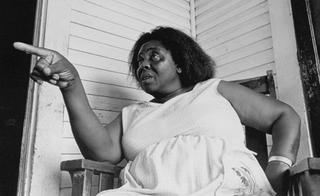Fannie Lou Hamer

Fannie Lou Hamer -- sharecropper and voting rights activist – was born on this day in 1917 in Ruleville, Mississippi.
The youngest of 20 children born to her sharecropper parents, Hamer picked cotton from the age of 6 and received a minimal education before leaving school to cut corn stalks and help support the family. She married in 1944 and spent the next 18 years sharecropping on the Marlowe Plantation.
In August 1962, Hamer attended a civil rights meeting sponsored by the Southern Christian Leadership Conference (SCLC) and was inspired to go to the Sunflower County seat at Indianola to register to vote. "I didn't know that a Negro could register and vote," she recalled. Hamer was rebuffed at the courthouse and turned out of her home at the Plantation for trying to register.
From that time on, Hamer devoted her life to securing a political voice for African-Americans. On her third try in June 1963, Hamer was finally permitted to register, but on her return home she was arrested and severely beaten by white police in Winona, Mississippi, experiencing permanent damage to her arm and kidneys. Coincidentally, as she lay in her jail cell, swollen and blue, Mississippi NAACP leader Medgar Evers was assassinated outside his home in Jackson, Mississippi.
Even within this climate of savage violence, Hamer took her commitment to voting rights to the next level by helping to establish the Mississippi Freedom Democratic Party (MFDP). In June 1964, Hamer and three others from the MFDP appeared on the ballot for delegates to the Democratic National Convention. They were defeated, but their activism attracted the attention of Democrats in other states, and delegates in Michigan and New York voted to endorse the MFDP delegation in lieu of the all-white segregationist slate.
Meanwhile, delegations from five other Southern states threatened to walk out of the Convention if the MFDP delegates were seated. President Lyndon Johnson, nervous about the effect of this controversy on his chances in the November election, asked Senator Hubert Humphrey to arrange a compromise (despite the fact that Johnson had already privately promised Mississippi governor Paul Johnson that the MFDP would not be seated).
In the most dramatic moment of the entire 1964 presidential campaign, Fannie Lou Hamer testified before the Democratic Party Credentials Committee in a fine, mellow voice, chanting with grief over the beating she received at Winona and over the immorality of leaving her race behind.
While the MFDP did not win their seats, they won a larger victory: the compromise, worked out in negotiations between MFDP attorney Joseph Rauh and Humphrey's lieutenant, Walter Mondale, provided that two MFDP members would be seated as alternates with full right to vote, and that in 1968 and at all Conventions thereafter, no delegation would be seated where the Party process deprived citizens of the right to vote by reason of their race. (During the course of those negotiations, when Humphrey asked Rauh to provide assurances that the Mississippi group would not upset Johnson's re-election bid, Rauh defiantly replied, "Why don't you tell [the President] I'm a dirty bastard and completely uncontrollable?")
Hamer called the short-term fix "token rights" and denounced the treatment of the MFDP; but in the years following the Convention, Hamer did not give up her fight. Through her work with MFDP, she helped organize food cooperatives and day care centers; she even ran (unsuccessfully) for state senate in 1971.
She died on March 15, 1977 in Mound Bayou, Mississippi. On her tombstone is the epitaph "I am sick and tired of being sick and tired."
For those among us who think the Voting Rights Act is out of date and need not be renewed, it is worth remembering what it took to get here, and that issues still arise. See: http://moritzlaw.osu.edu/blogs/tokaji/.
Labels: Civil Rights, Trailblazing Women





3 Comments:
This lady is a real hero.
Mama Fannie Lou Hamer is a hero during the civil right struggle in the sixties.
Mama Fannie was so brave and she fought vigiously to stop the racial injustice against African people in Mississippi.
Mama Fannie might have being sick and tired of the racist and evil brutality in Mississippi, but she wasn't one to give up, because she continued and paid the price.
Despite the racial murders of Papa Medgar Evers, Brother Emmett Till and Brother James Chaney, Mama Fannie Lou Hamer fought and fought to make African people in Mississippi stand up, for their rights to defeat the racial injustice done upon us.
Mama Fannie Lou Hamer was a hero amongst the civil rights struggle in Mississippi.
She is a great soul, and she is a very beautiful woman.
Post a Comment
Subscribe to Post Comments [Atom]
<< Home